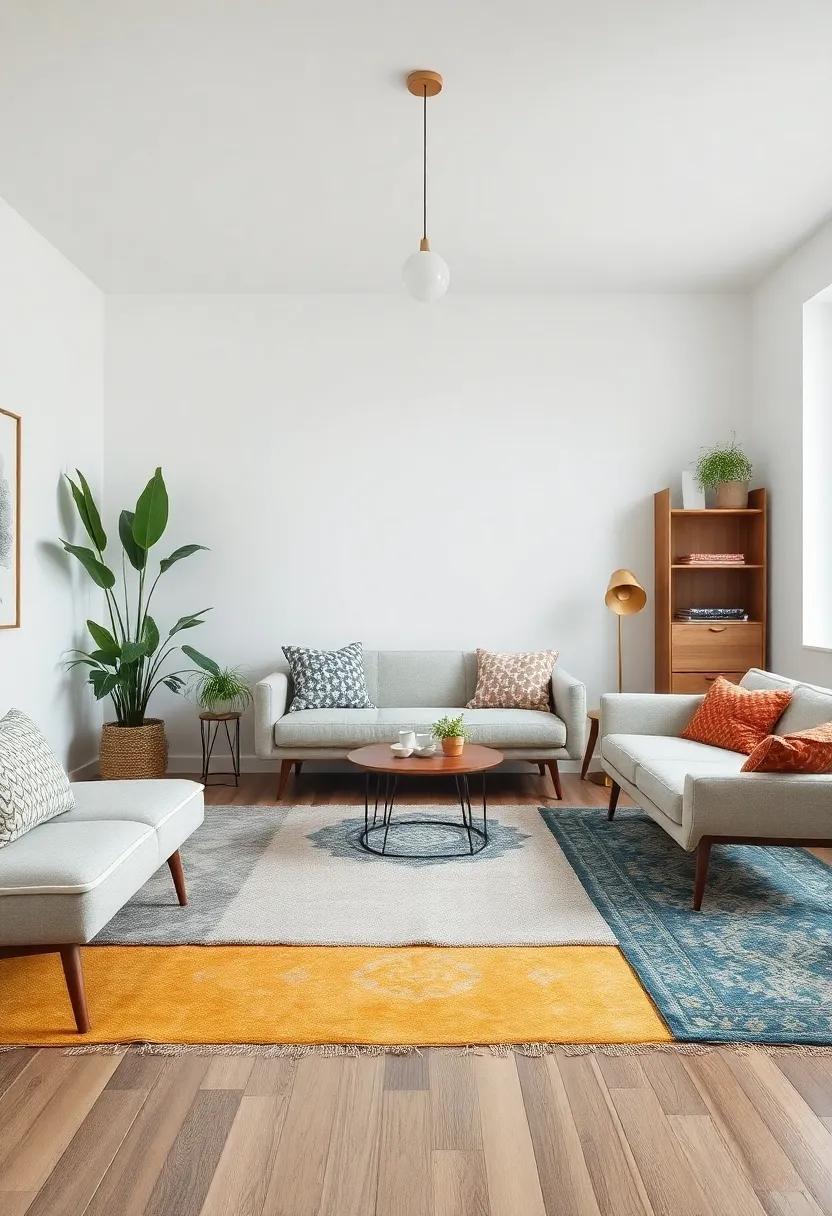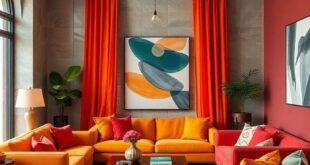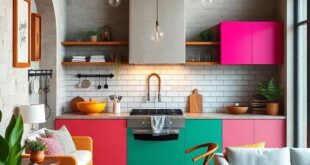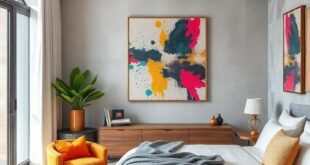In a world where uniformity often reigns supreme, the allure of eclectic design beckons those ready to step off the beaten path. Imagine a living space that tells a story—one woven from vibrant colors, playful patterns, and textures that interact in harmonious dialog. At the heart of this visual symphony lies an often-overlooked element: the mismatched rug. No longer relegated to the realm of chaotic or haphazard decor choices, these distinctive floor pieces invite a sense of spontaneity into your home, offering a canvas on which to express individuality. In this article, we will explore the art of embracing the unexpected, guiding you through the principles of eclectic room design with a focus on the transformative power of mismatched rugs. From curating complementary palettes to balancing bold patterns, discover how to turn the seemingly disjointed into a cohesive and inviting sanctuary—one rug at a time.
Embracing Contrast: The Art of Combining mismatched Rugs in Your Living Space
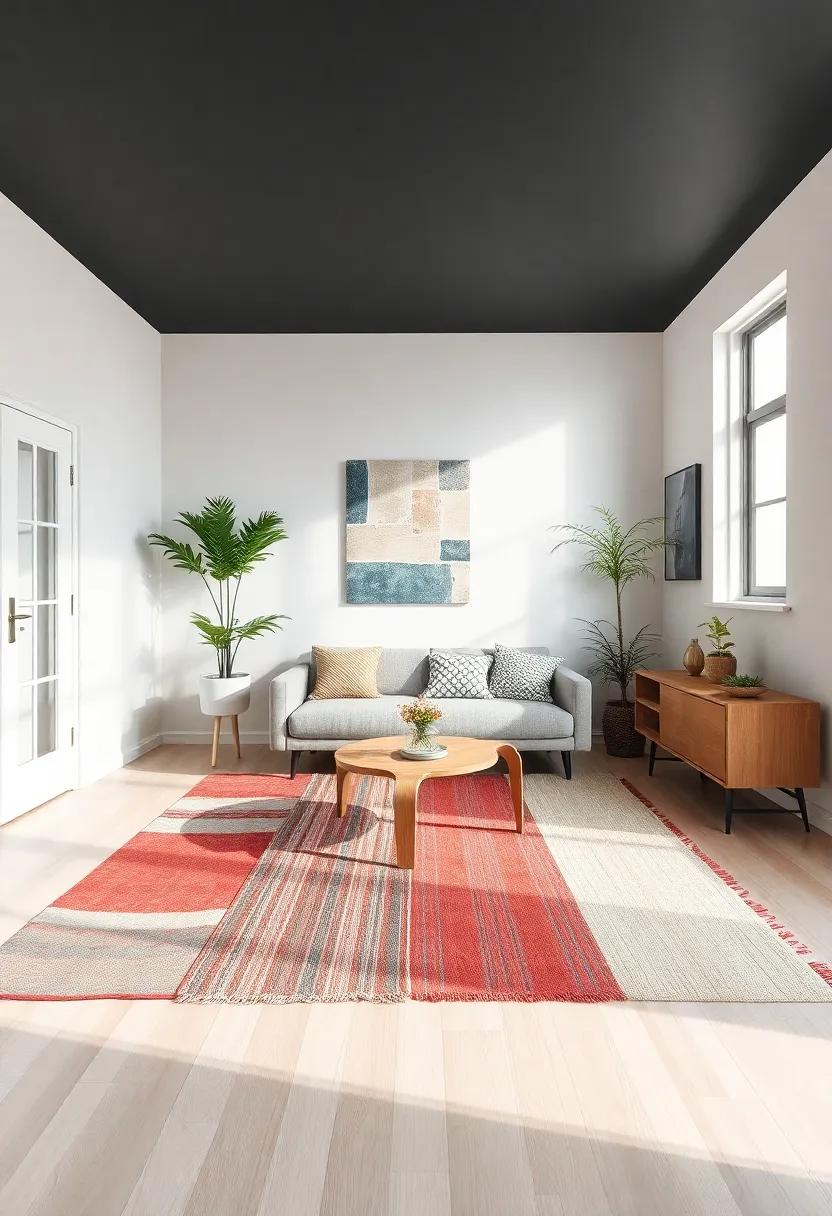
When it comes to interior design, the idea of combining mismatched rugs might seem daunting. However,this bold choice opens up a world of possibilities,allowing you to create a space that reflects your personality and style. Consider the following elements when curating your eclectic look:
- Colour Palette: Choose rugs that share a common color thread; even different patterns can harmonize beautifully if they echo similar hues.
- Texture Variation: Experiment with various materials, from plush pile to flatweave. The contrasting textures can add depth and character to your room.
- Size and Scale: Mix larger area rugs with smaller accent pieces, playing with size to define different areas within a room.
To harmonize your mismatched rugs, consider their placement and visual flow. Use a layering technique that allows each rug’s style to shine while maintaining balance. Hear’s a simple table to help visualize your rug combinations:
| Rug Type | Ideal Pairing |
|---|---|
| Geometric Pattern | Soft Solid |
| Floral Design | Stripes or Checks |
| Natural Fiber | Bold Color |
Ultimately, the key to successful rug mixing lies in your willingness to embrace the unexpected. Let your creativity guide you as you explore configurations that embody your unique aesthetic vision, turning your floor into a canvas for personal expression.
Color Harmony: finding Balance with Diverse Rugs in Eclectic Interiors
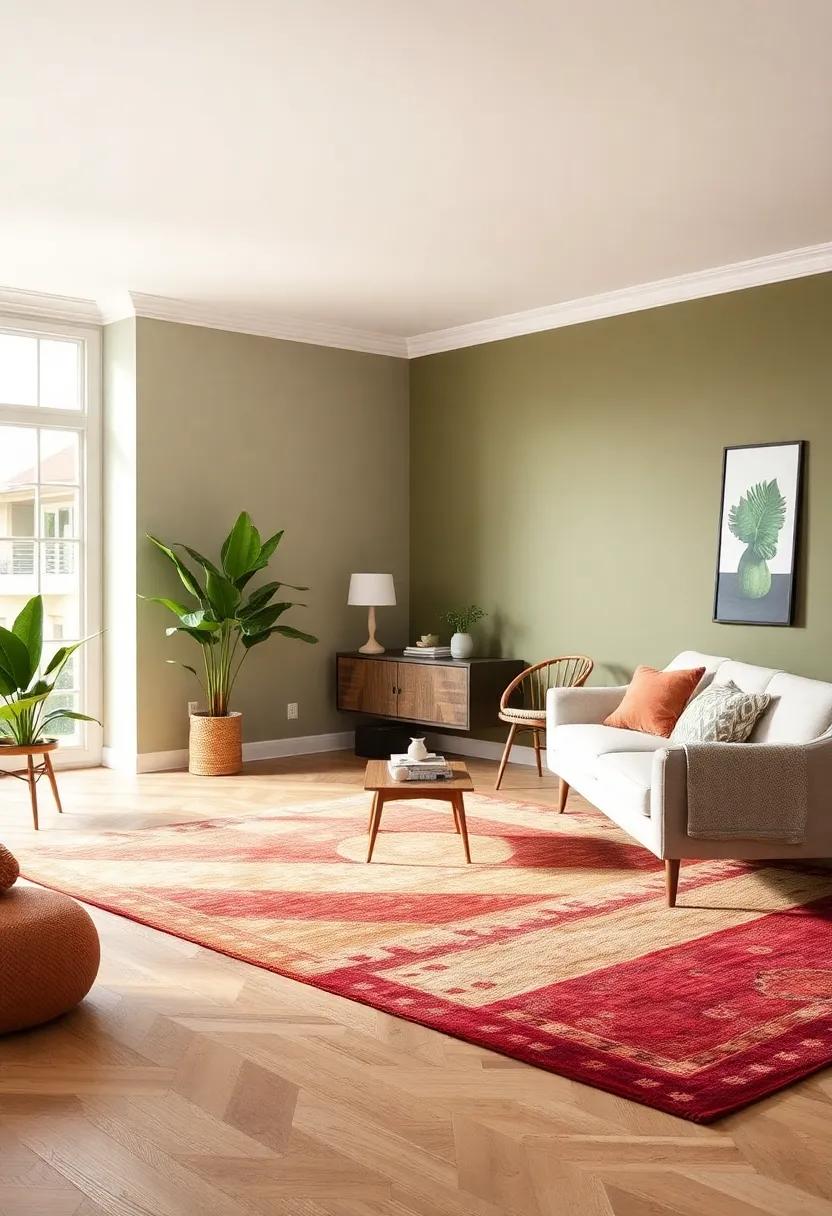
In the world of eclectic interiors, achieving color harmony is an art that requires a keen eye and a flair for combining the unexpected. When incorporating diverse rugs, it’s essential to focus on a cohesive color palette that allows each piece to shine while still complementing one another. Consider grouping rugs based on shared colors or themes, which can anchor your design while still celebrating individual character. Look for patterns that echo the hues found in your furnishings or artwork:
- Muted tones to balance bold colors
- Natural fibers for texture contrast
- Geo prints to add a contemporary twist
- Traditional motifs for a timeless feel
To further refine your space, structure your arrangement around a central rug that can serve as a dominant focal point. Augment this foundation with smaller rugs layered atop or alongside, creating depth without overwhelming the space. Here’s a sample layout for visual guidance:
| main Rug Style | Complementary Rug | Suggested Placement |
|---|---|---|
| Geometric Radiant | Subtle Persian | Under coffee table |
| Natural Jute | Colorful Kilim | Layered in front of sofa |
| Monochrome Stripes | Floral Accent | Beside armchair |
Layering Textures: The Foundation of Eclectic Room Design with Rugs
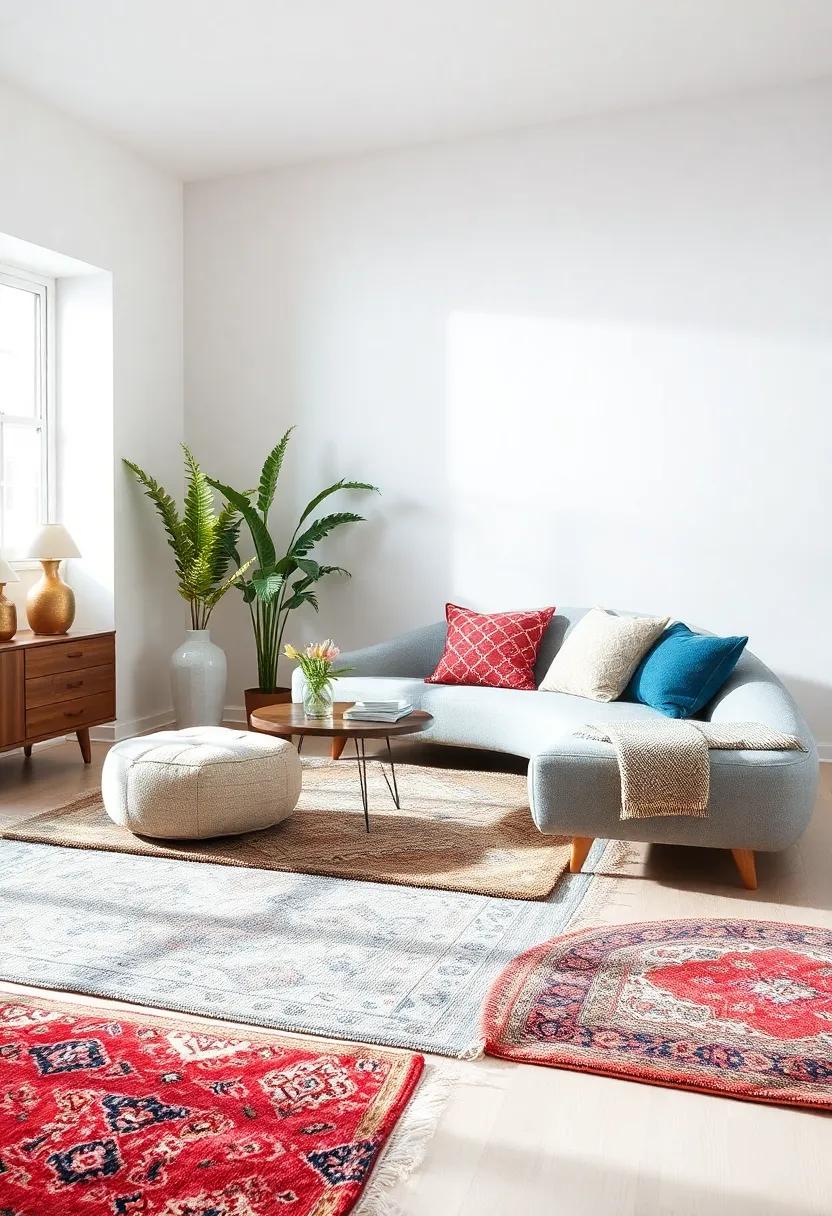
Layering textures is a pivotal aspect of eclectic room design, notably when it comes to the artful arrangement of rugs. By combining various materials and patterns, you can create a captivating visual tapestry that draws the eye and invites exploration. Consider these key elements when curating your rug ensemble:
- Mix Materials: Pair a plush, shaggy rug with a sleek, flat-weave option for an engaging contrast.
- Play with patterns: Layer bold geometric designs over intricate Persian motifs to create depth and interest.
- Vary Sizes: Use a large area rug as a base, then add smaller accent rugs to define different areas or functions within the space.
To truly master this technique, it’s essential to maintain a cohesive color palette that echoes through the layered textures. Using a common color can help unite diverse designs, resulting in a harmonized aesthetic. Here’s a simple overview of how different textures can interact:
| Texture Type | Visual Effect |
|---|---|
| Shaggy | Cozy and inviting. |
| Flat-Weave | sleek and sophisticated. |
| Jute | natural and rustic. |
| Velvet | Luxurious and soft. |
The Role of Patterns: Mixing designs for a Unique Look in Your Home
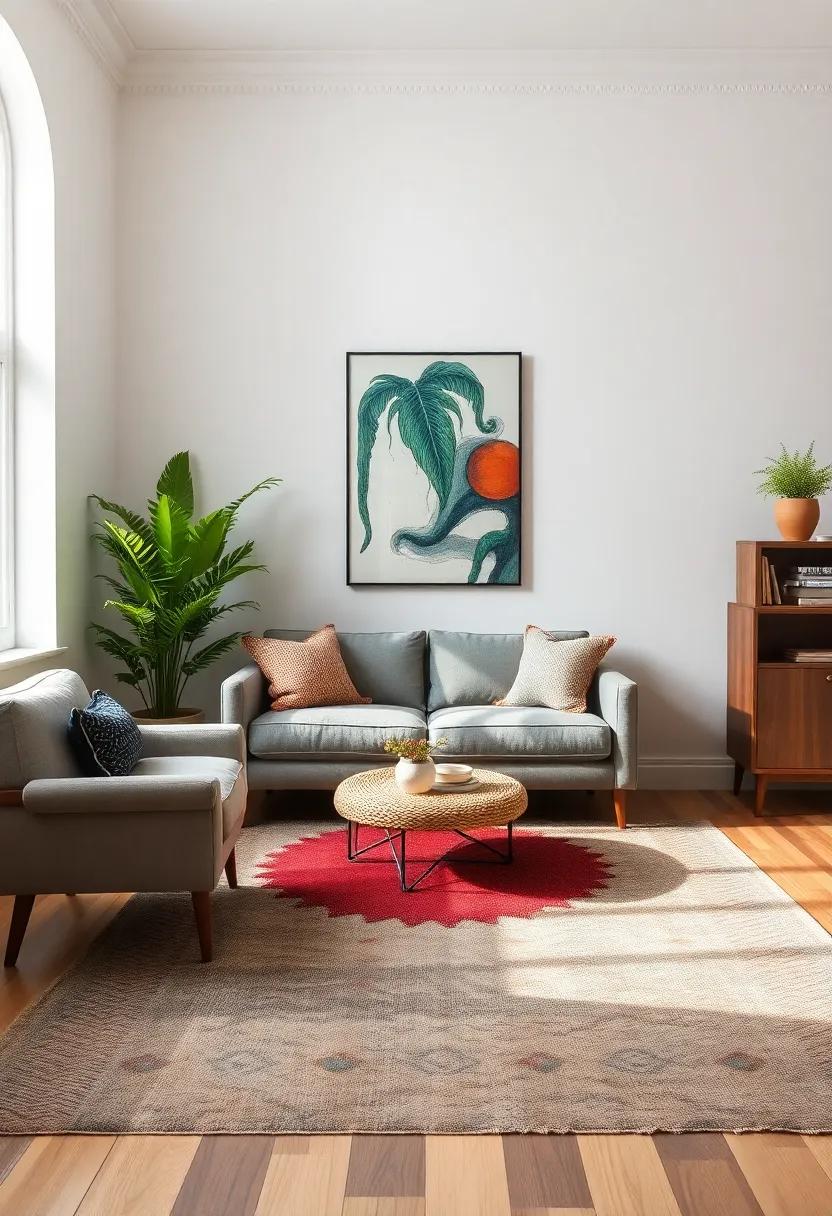
In the world of interior design, the art of mixing patterns opens up an array of possibilities, allowing homeowners to express their individuality and creativity. When it comes to combining mismatched rugs, embracing bold colors and varying textures can unify diverse elements in a room. Consider incorporating designs that share a common theme or style—like a sophisticated bohemian tapestry paired with a geometric print—and let them coexist harmoniously. To achieve a balanced look, pay attention to:
- Color Palette: Choose colors that complement each other, even across different patterns.
- Scale Variation: Use both large and small patterns to create visual interest without overwhelming the space.
- Texture Play: Combine smooth and textured rugs to add depth and contrast to the flooring.
unlike traditional decor, eclectic design thrives on the unexpected; therefore, doorways to innovative ideas can be found even in the most unconventional combinations.For instance, consider layering a vintage Persian rug atop a modern abstract design to create an intriguing focal point. To help visualize how different patterns can interact, a simple comparison table can illustrate potential pairings:
| Pattern Type | Suggested Pairing |
|---|---|
| Floral | Geometric |
| Stripes | Polka Dots |
| Animal Print | Textured Solid |
by allowing freedom in your design approach, you can craft spaces that tell a story and reflect your personal style. Don’t hesitate to mix different design periods and influences, as this variation is the hallmark of eclectic decorating. Each rug serves not just as a decorative element but as a piece of the larger narrative of your home, intertwining comfort and art in every thread.
Cohesion Through Color: Creating a Unified Space with Diverse Rugs
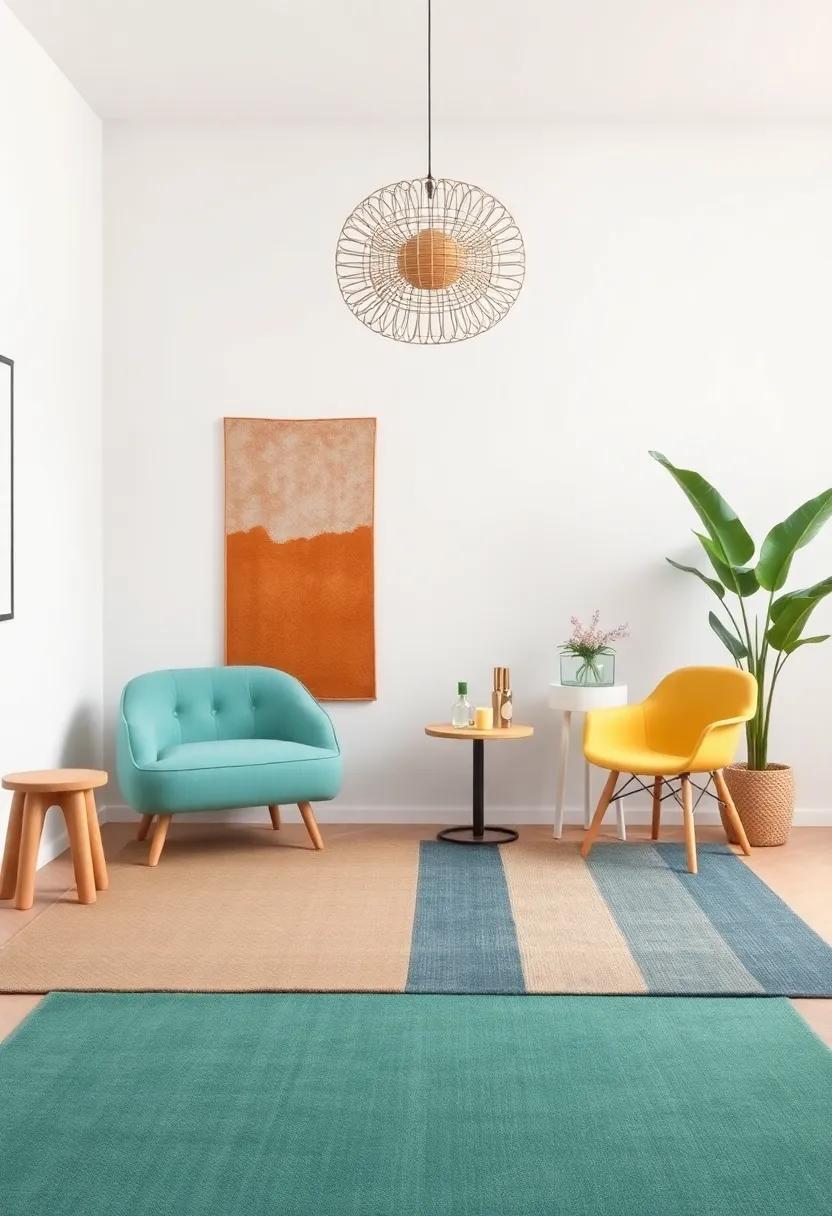
In the world of eclectic design, color acts as a powerful unifying force, weaving together disparate elements to create a harmonious atmosphere. When incorporating mismatched rugs into your space, consider how their colors interact with one another and with the surrounding decor. Selecting rugs that share a common color palette or that complement each other through tonal variations can create a sense of continuity amidst diversity. As an example, a bold, geometric rug in deep teal can coexist beautifully with a vintage floral print in similar hues, offering a pleasing visual rythm throughout the room.
To ensure a cohesive look while embracing a mix of styles, focus on a few core color elements:
- Accent Colors: Use vibrant accents from the rugs to pull through into your accessories, like cushions or artwork.
- Materials: Consider the texture in addition to color; a plush, shaggy rug can balance the sleekness of a flat-weave choice.
- Layering: Create depth by layering rugs, allowing colors and patterns to interact, adding richness to the space.
Utilize a color coordination table to visualize and match shades across different rugs, ensuring a playful yet refined approach:
| Rug Type | Main Color | Complementary Colors |
|---|---|---|
| Geometric Pattern | Deep Teal | Aqua, Coral |
| Floral Print | Rust Red | Mustard Yellow, Olive Green |
| Shaggy Layer | Cream | Soft Gray, Blush Pink |
Storytelling Through Rugs: Infusing Personality into Your Eclectic Design
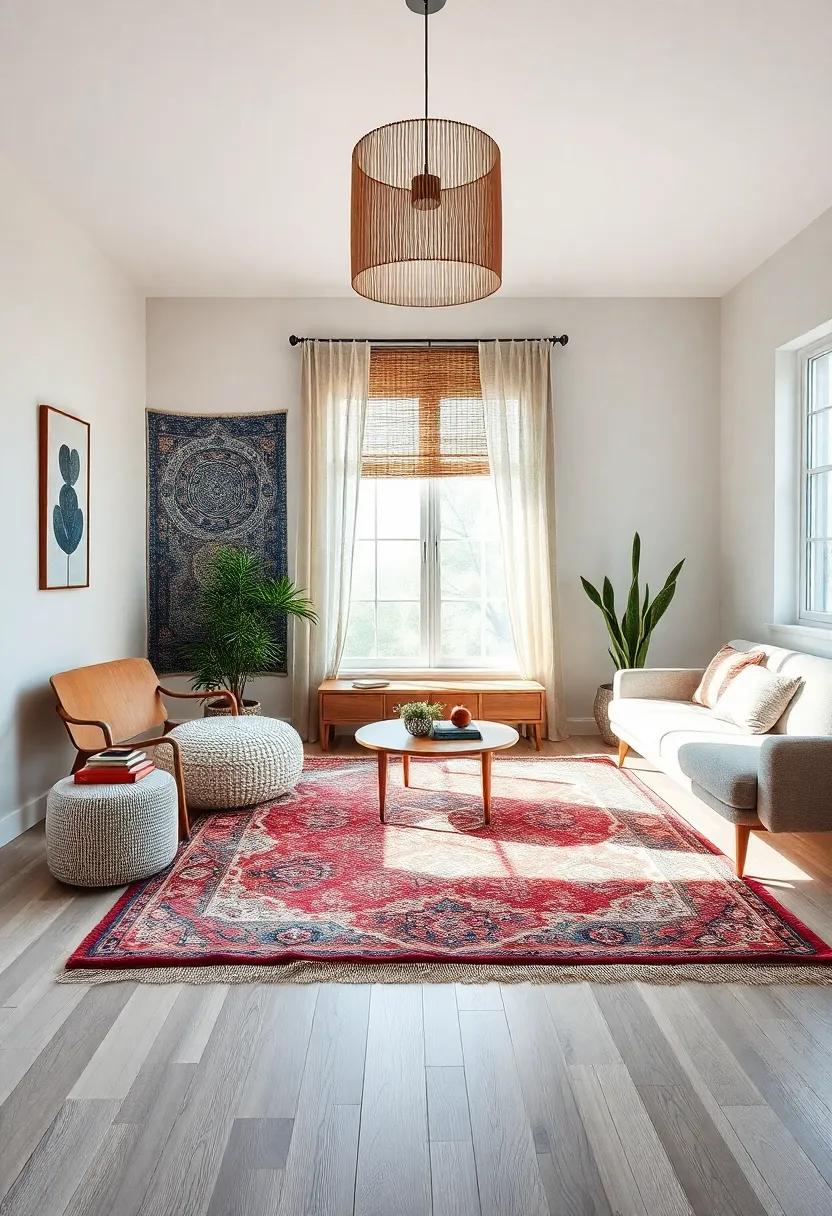
Rugs have long been a essential element in home decor, but when it comes to eclectic design, they become storytellers that convey personality and narrative within a space. Each rug can offer a unique glimpse into various cultures, eras, and artistic styles. When layering mismatched rugs,consider how each piece not only complements but also contrasts with the surrounding elements. Look for vibrant patterns that spark joy or woven textures that invite tactile exploration. The key is to find a balance that reflects individuality while maintaining a cohesive atmosphere. using rugs as a canvas, you can showcase color palettes and themes that resonate with your personal history and experiences.
To think of your rugs as portals to different stories, one might explore various design themes to curate a space that’s rich in character. Consider these approaches when selecting your pieces:
- Heritage from Abroad: Incorporate a Persian or Kilim rug that adds an exotic flair.
- Modern Minimalism: Contrast a bold geometric rug with soft, muted decor for a stunning juxtaposition.
- Bohemian Chic: Layer multiple textures and colors to create a cozy, lived-in vibe.
Strategic Placement: How Positioning Mismatched Rugs Defines a Room
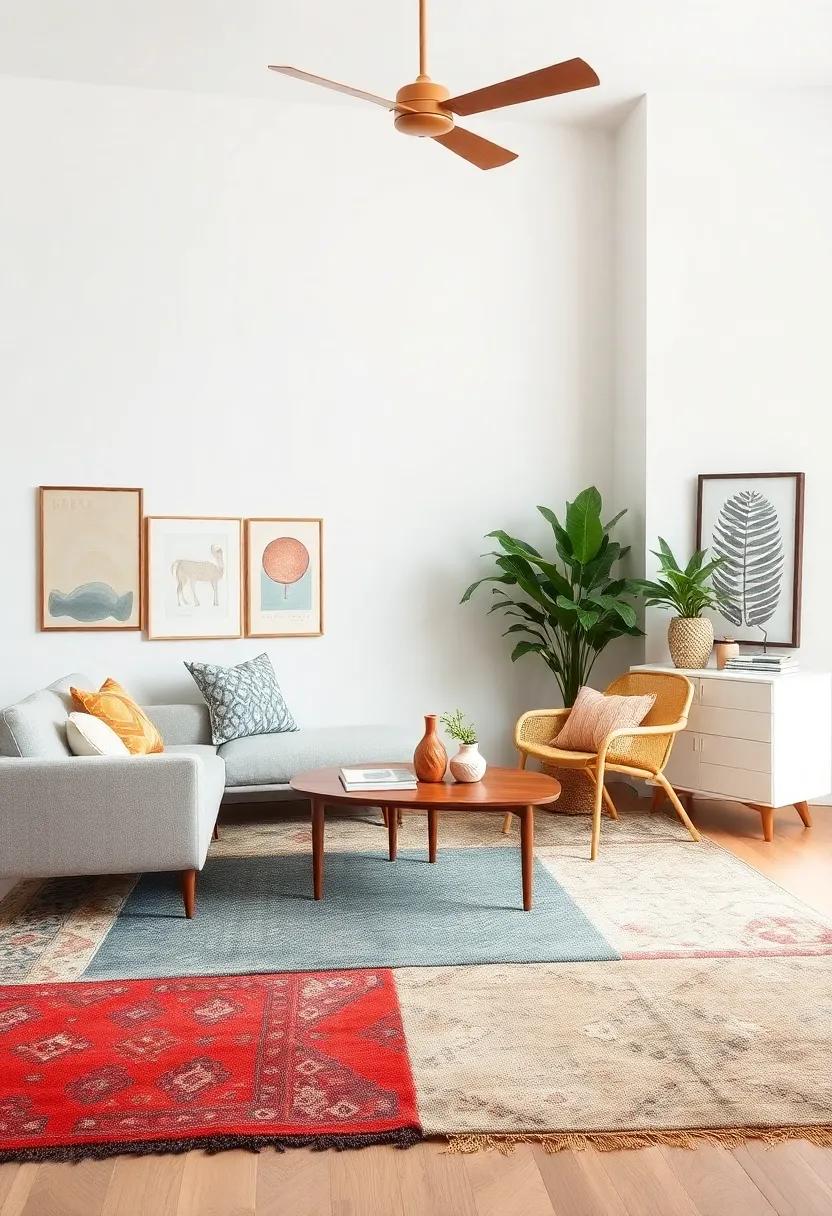
Incorporating mismatched rugs into a room can transform its character, creating an inviting and dynamic atmosphere. The strategic deployment of various styles, colors, and textures not only draws the eye but can also delineate different functional areas. By placing a bold, vibrant rug beneath a coffee table in a lounging area, such as, you create a focal point that encourages conversation and relaxation. Meanwhile, a more subdued pattern can cushion the feet in a reading nook nearby, contributing to a cozy, intimate vibe.When you layer these choices, you invite a dialogue between the elements, enhancing the visual storytelling of the space.
Consider the following tips when positioning your eclectic rug ensemble:
- Contrast Textures: Pair a plush shag rug with a sleek, flat-weave one to create tactile interest.
- Balancing Colors: Use a color wheel to identify complementary colors that will harmonize the rugs.
- Shape Play: Combine circular rugs with rectangular pieces to break the monotony of linear furnishings.
| Rug Type | Ideal Room Use |
|---|---|
| Persian Rug | Living Rooms |
| Jute Rug | Entryways |
| Vintage Kilim | Dining Areas |
| Modern Geometric | Home Offices |
Ultimately, the key to successfully defining spaces with mismatched rugs lies in the careful blend of aesthetics and practicality. Each piece serves not only as décor but also as a functional element that shapes movement and flow throughout the room. by taking these creative risks, you can craft a layered, harmonious environment that reflects your personal style and encourages spontaneity in design.
Defining Zones: Using Rugs to Create Functional Spaces in Open Areas
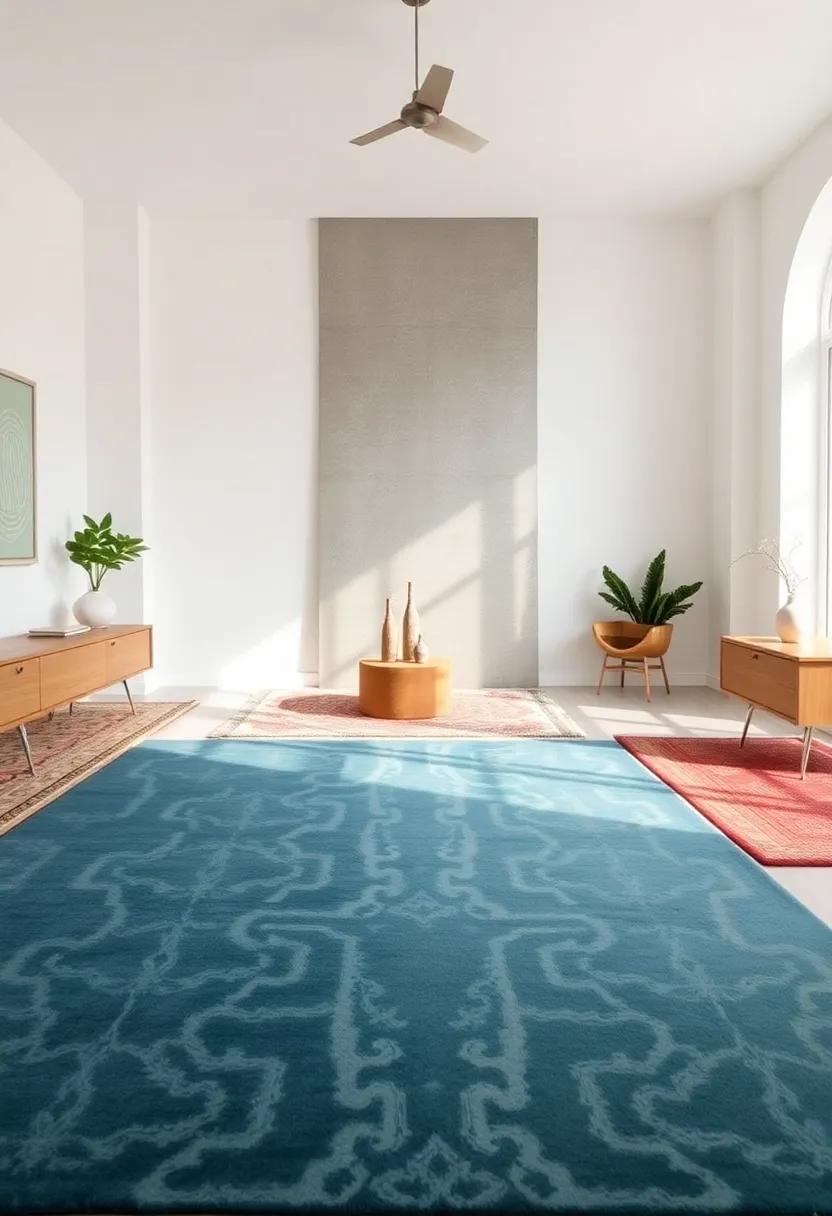
In open areas,rugs serve as versatile tools to delineate spaces and create intimate atmospheres. By thoughtfully layering mismatched rugs, you can effortlessly separate different functional zones, making it easier for your guests to navigate and enjoy the area. Consider placing a large,vibrant rug beneath a coffee table to define a cozy seating area,while a smaller,textured rug can highlight a reading nook nearby. This juxtaposition not only adds visual interest but also emphasizes the unique character of each space.
When selecting your rugs, aim for a balance of colors, patterns, and sizes. Some effective strategies to achieve this harmonious look include:
- Choose a common thread, like a color or pattern, that ties the rugs together
- Utilize rugs with varying textures to add depth
- Layer different shapes, such as round and square, to create dynamic interactions
Incorporating this approach not only enhances the functionality of your open area but also fosters a sense of whimsy and creativity, inviting curiosity and conversation among guests.
Unexpected Combinations: Pairing Vintage and Modern Rugs Effortlessly
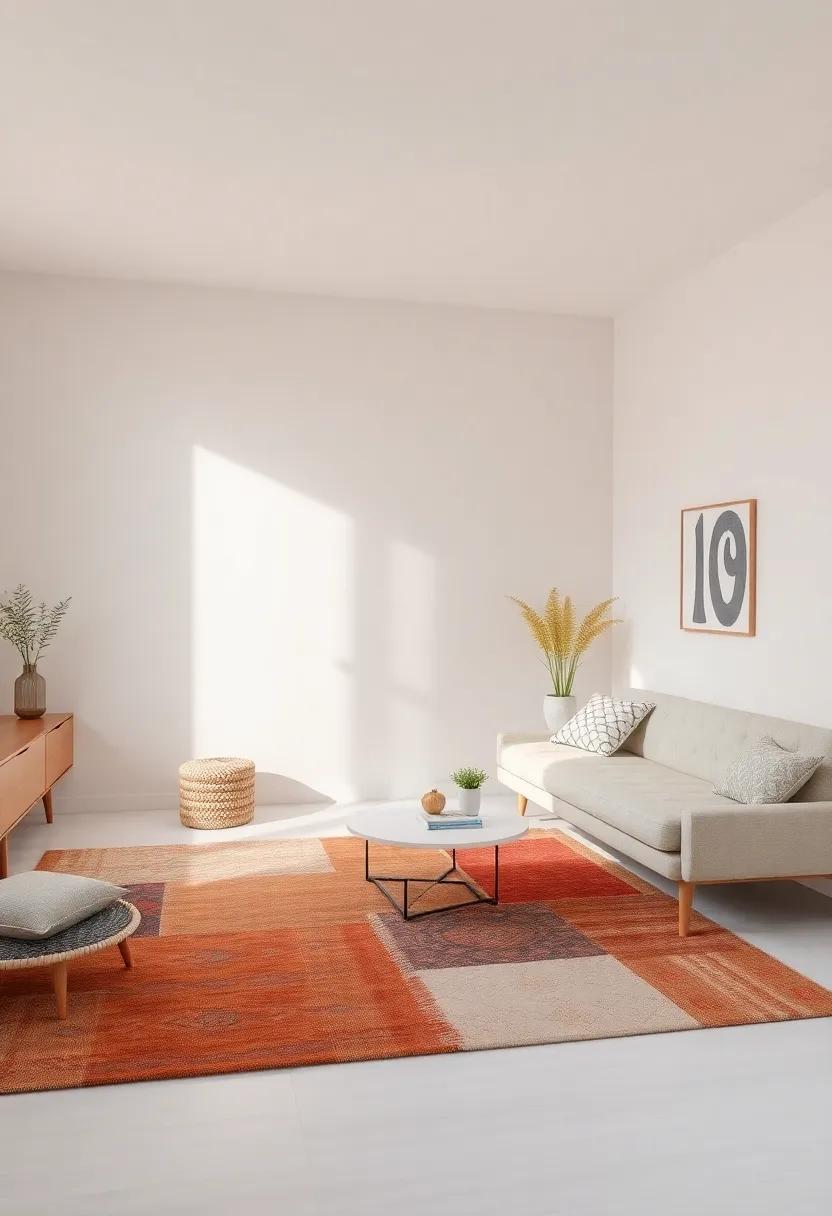
Pairing vintage and modern rugs is an art that allows you to create spaces that are both intriguing and harmonious. When selecting your rugs, think about contrasting elements that will enhance the individuality of each piece. As an example, a bold geometric patterned contemporary rug can serve as a striking backdrop for a delicate, hand-woven persian carpet, combining the sharp lines of modern design with the intricate textures of vintage craftsmanship. Consider layerings such as:
- Color Harmony: Choose a color palette that allows the vintage charm and modern flair to complement each other without clashing.
- Texture Play: Mixing plush,shaggy rugs with sleek,flat-weave designs can create delightful visual and tactile contrasts.
- Size Variations: Oversized rugs can dominate a space, while smaller, vintage styles can add focal points within defined areas.
When arranging your rugs, focus on visual balance. A carefully considered layout can make mismatched pieces feel cohesive. For example, you might place a modern rug under a coffee table in a living area, while a vintage runner finds its place in a nearby hallway. This juxtaposition can create distinct zones within an open space. Utilize the following ideas when styling your room:
| Rug Style | Best Pairing |
|---|---|
| Vintage Oriental | Minimalist Geometric |
| Modern Shag | traditional Kilim |
| Contemporary Abstract | Classic Braided |
Cultural Influences: Incorporating Global Textiles into Eclectic Designs
In the realm of eclectic room design, textiles serve as vibrant threads that weave together diverse cultural narratives. By integrating global fabrics, you create a tapestry of textures and colors that speaks to your unique aesthetic while celebrating the richness of different heritages. Consider incorporating pieces like:
- Moroccan Berber rugs – their bold geometric patterns and plush feel add warmth and character.
- Indian block-printed textiles – these intricate designs can bring a splash of muted charm to your decor.
- Turkish kilims – flatwoven and frequently enough brightly colored, they offer a versatile layering option.
- Japanese shibori fabrics – the artful dye techniques introduce elegance and tranquility.
In blending these global textiles, you enable each piece to stand out while harmonizing within the overall design. The key to mastering this eclectic style is balancing not just patterns and colors, but also meaning. Here’s a simple table to consider how different elements can coexist within your space:
| Textile Type | Main Characteristics | Ideal Pairings |
|---|---|---|
| Berber Rugs | Textured, bold patterns | Minimalist furniture, earth tones |
| Block-Printed Fabric | Intricate, nature-inspired designs | Simple solids, rustic decor |
| Kilims | Colorful, flatwoven | Modern minimalism, soft textures |
| Shibori Textiles | Elegant, soft hues | Natural wood, soft linens |
Seasonal Shifts: Adapting Rug Styles for Year-Round Appeal
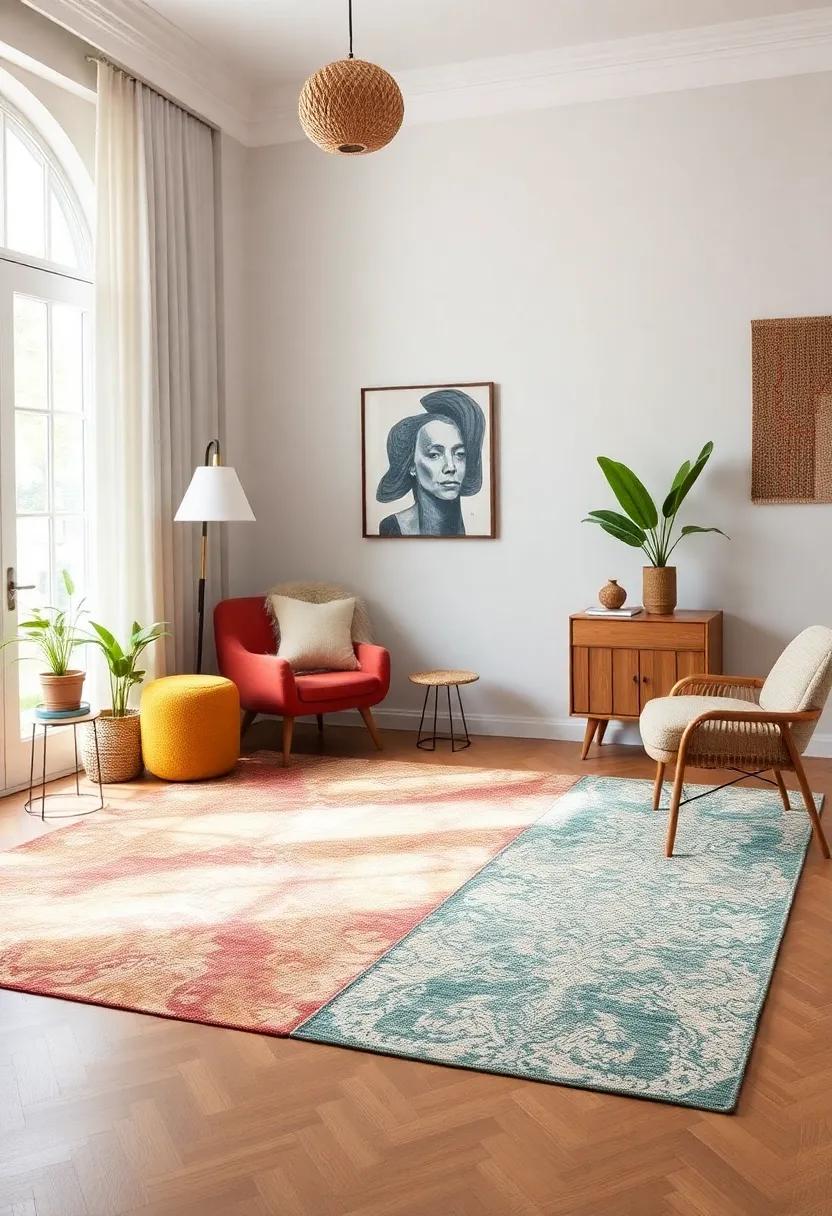
As the seasons change, so too can the mood of our spaces. Transitioning rug styles is a delightful way to refresh your decor while maintaining a cohesive aesthetic. consider incorporating natural fibers such as jute or sisal in warmer months, allowing the light and airiness of summer to shine through. As autumn approaches,swap in plush textures like wool or shag,which add warmth and comfort during those cooler evenings. The key is to embrace the season’s colors—rich ochres and deep greens can inject a cozy feel, while brighter and lighter tones can uplift the space when the days are long.
From the playful designs of floral patterns in spring to more muted, introspective motifs of the winter, mismatched rugs allow for a dynamic interplay of styles. To create a harmonious look throughout the year, try to maintain a balance in color schemes and patterns.As a notable example, pairing a vibrant, eclectic rug with something more subdued can prevent overwhelming the room. Utilize a simple guideline to swap rugs effectively:
- Spring/Summer: Light, airy fabrics with bold, fresh colors
- Fall/winter: Warm, layered textures with earthy tones
This way, each seasonal shift not only keeps your home feeling current but also becomes a backdrop for personal expression and creativity.
Visual Movement: Guiding the Eye with Mismatched Rugs in Design
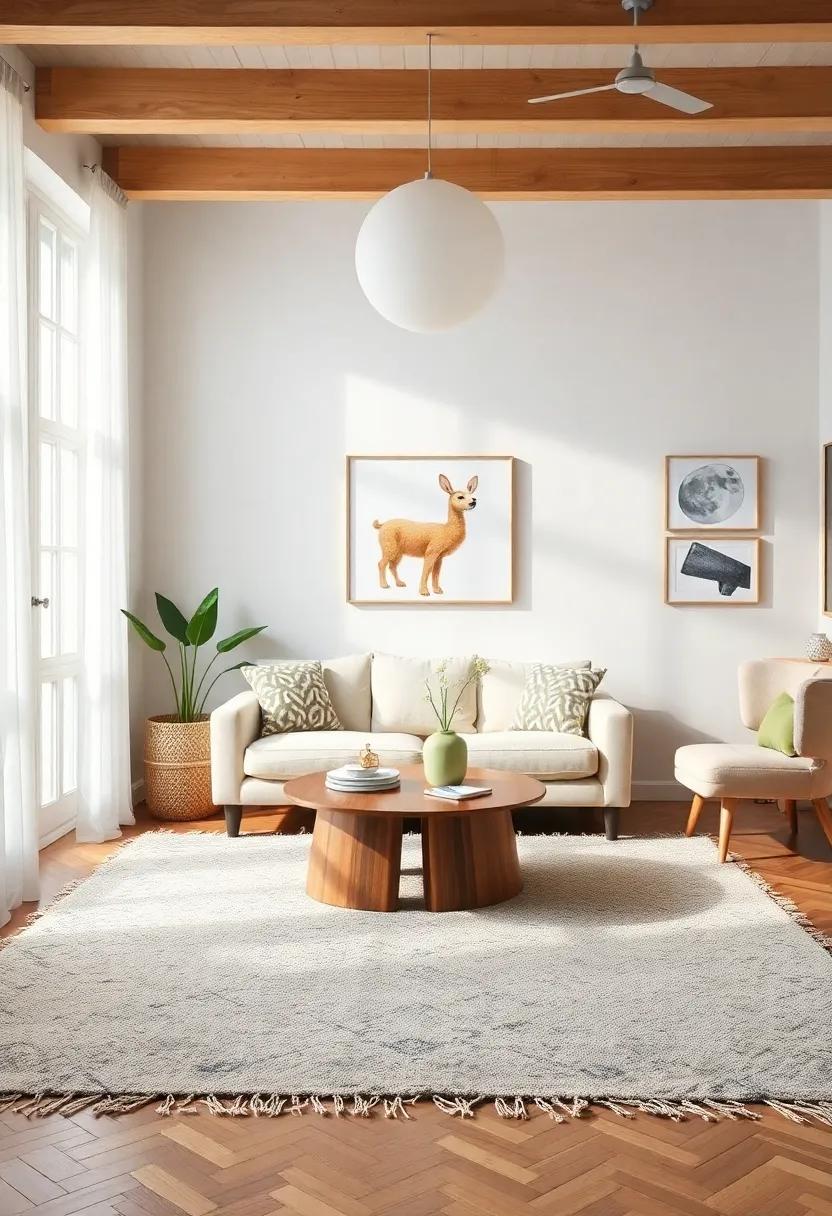
In the realm of interior design, visual movement plays a critical role in creating spaces that captivate and engage. Combining mismatched rugs invites a playful flux of patterns, colors, and textures that guide the eye naturally from one area to another. This delightful contrast can create focal points where soft hues draw attention,while bolder designs add depth.Here are a few strategies to enhance your space:
- Layering Textures: Start with a base rug, then add smaller, eclectic layers that contrast or complement.
- Color Harmony: Pick a unifying color from one rug and find another that echoes it—this ties the different designs together.
- Shape Variation: play with geometric and organic shapes to create dynamic dialogues within your floor design.
Leverage these techniques to ensure that each rug doesn’t just coexist but interacts, creating a visual narrative that flows throughout. Consider the arrangement as an art piece rather than a functional necessity.When you maximize space by incorporating different dimensions,you encourage movement across your room,evoking curiosity and delight.Look at the table below for rug placement ideas based on room types:
| Room Type | Rug Placement Ideas |
|---|---|
| Living Room | Layer a round rug over a larger rectangular one for contrast. |
| bedroom | Mix a faux fur rug with a patterned one at the foot of the bed. |
| Office | Use a bold graphic rug under an open workspace to energize the area. |
Accessories for Impact: complementing Eclectic Designs with Statement Pieces
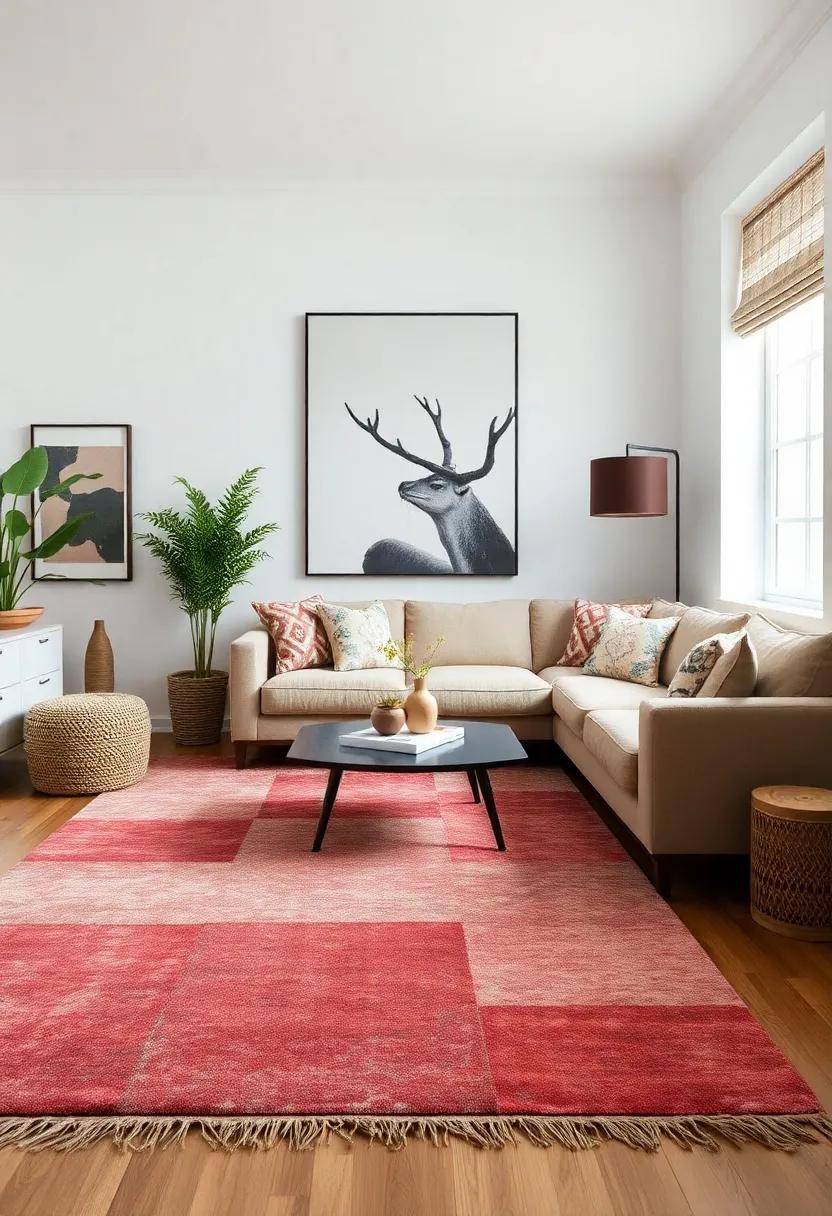
To elevate an eclectic design scheme,incorporating statement accessories is key. These distinctive pieces serve as the punctuation marks of your space, drawing the eye and enriching the overall ambience. Consider integrating accessories such as:
- Bold Artworks: Large, vibrant canvases can serve as a stunning focal point.
- Unique Sculptures: Look for pieces that tell a story or provoke thought.
- Colorful Vases: These are perfect for adding splashes of color and texture when paired with mismatched rugs.
Mixing and matching textures, forms, and colors encourages a visual dialogue that reflects your personal style. To ensure coherence in your design, use a consistent color palette that ties the accessories back to your chosen rugs. You can also think about layering with varied materials such as:
- Natural Textiles: Linen, cotton, and wool can add warmth.
- Metal Accents: Incorporating brass or silver can inject a modern twist.
- Glass Elements: These can provide lightness and airiness amidst denser textures.
When thoughtfully chosen, your accessories will not only complement your eclectic room design but will also amplify its uniqueness, harmonizing the mismatched styles into a cohesive, inviting space.
Functional Art: enhancing Your Room with stylish Mismatched Rugs
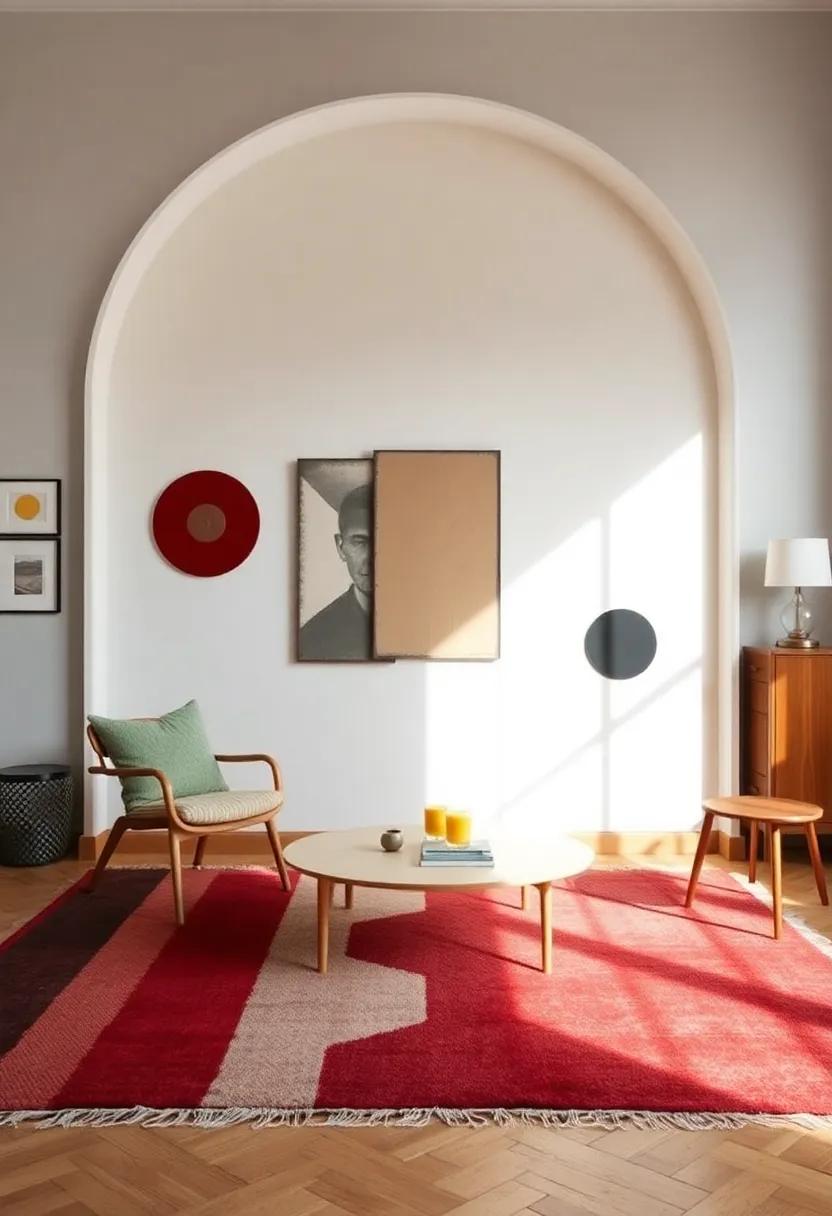
One of the most captivating ways to infuse character into your space is by incorporating mismatched rugs. These unexpected combinations can highlight your unique taste and create intriguing visual contrasts. Choose from an array of textures,patterns,and colors to construct a layered,cohesive look that tells an engaging story. Consider the following elements when selecting your rugs:
- Texture: Combine a plush shag with a flat-weave for dynamic tactile experiences.
- Patterns: Harmonize geometric shapes with organic prints to add depth and interest.
- Color Palette: Stick to a cohesive color scheme to maintain an overall sense of unity, even with varied designs.
When arranging your rugs,think about layout and flow. A clever focal point can be created by layering one rug over another, or by positioning smaller rugs in strategic areas to draw the eye.Don’t shy away from irregular shapes or sizes; these elements can enhance the room’s personality. Here’s a simple way to visualize effective rug pairings:
| rug Type | Best Pairing |
|---|---|
| Vintage Persian | Modern Geometric |
| Natural fiber | Bright Abstract |
| Shaggy | Patterned Kilim |
Creating a Focal Point: Using Rugs to Draw Attention to Key Areas
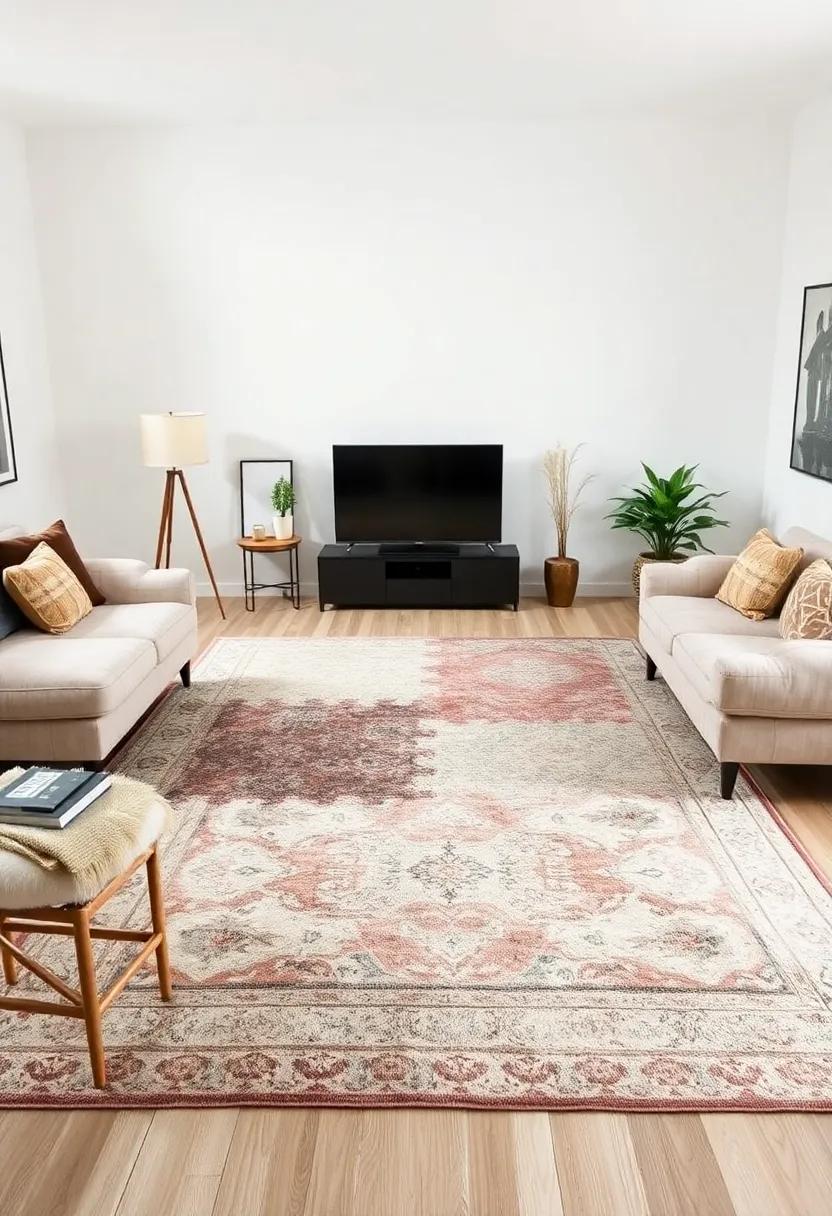
Rugs are more than just floor coverings; they are powerful tools for emphasizing the key areas of your space. By selecting vibrant, mismatched rugs, you can create a dynamic conversation nook or a cozy reading corner that beckons you and your guests to engage.Consider layering different textures and patterns to enrich the visual experience. As an example:
- Bold Stripes: Use a large striped rug to define a seating area, contrasting elegantly with softer, patterned textiles.
- Fringe Fun: Incorporate a vintage fringed rug that draws the eye and adds a playful element to the mix.
- Color Pop: Choose a brightly colored rug beneath a coffee table to serve as a focal point that harmonizes with surrounding décor.
A strategic placement of rugs can effectively guide the flow of your room while subtly delineating different functional spaces. Employing various shapes—pivoting from rounds in a dining area to rectangulars in living rooms—can further accentuate these areas. A well-arranged layout also ensures that the eclectic theme resonates throughout, bridging together colors, textures, and styles. Here’s a quick reference table showcasing how to use rugs in different sections:
| Space | Rug Type | Purpose |
|---|---|---|
| Living Room | Large Area Rug | Defines seating arrangement |
| Dining Area | Round Rug | Softens hard surfaces |
| Entryway | Runner Rug | Welcomes guests |
Layering Techniques: Mastering the Look with Multiple Rug Styles
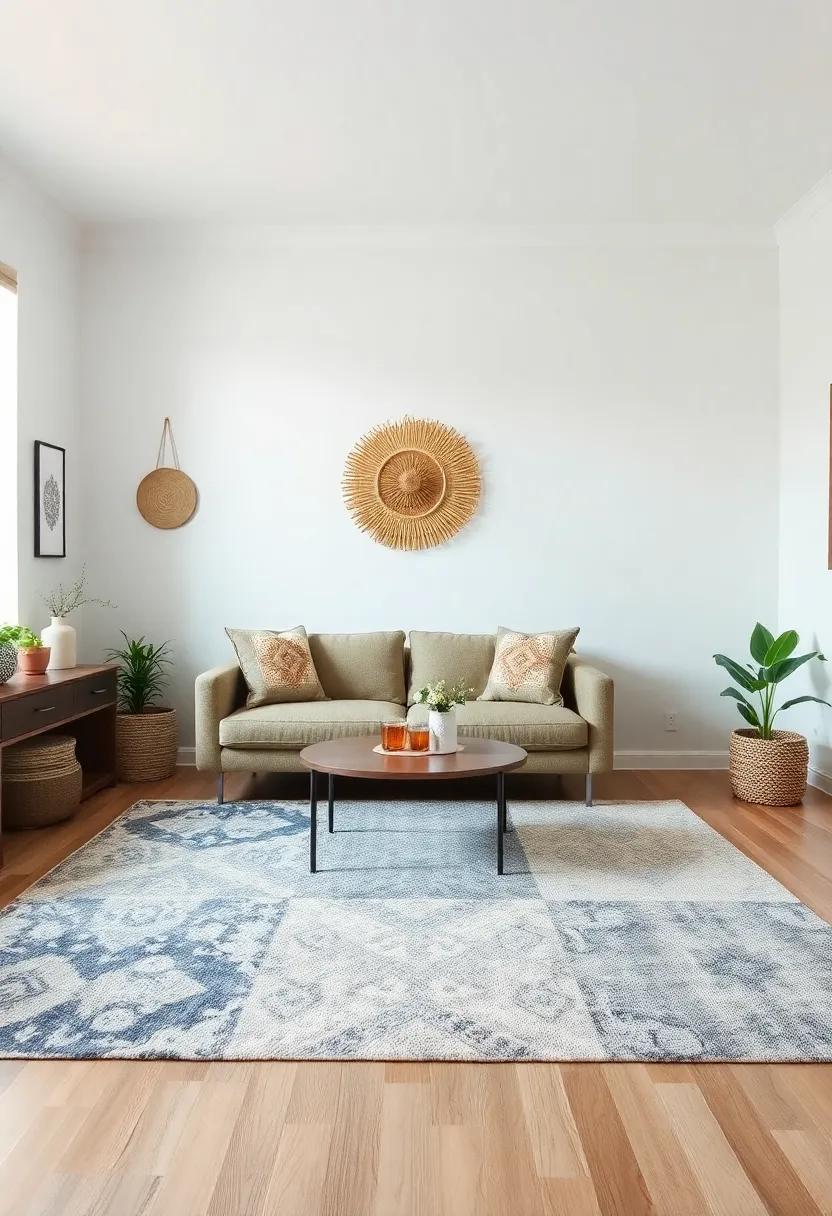
Layering rugs allows for an innovative fusion of textures,patterns,and colors that can transform any space into a vibrant expression of your personality. To master this art, start by selecting a base rug that sets the tone for the room. this could be a large, neutral piece that acts as a canvas. From there, consider introducing a variety of smaller rugs in contrasting designs. Mixing traditional, bohemian, and modern styles can create a striking visual intrigue, drawing the eye around the space. To ensure harmony, focus on a consistent color palette or complementary patterns that echo themes found in your furnishings.
Experimenting with proportions and placements also plays a crucial role in achieving an effortlessly layered look. Consider these simple yet effective techniques:
- Overlap strategically: Layer smaller rugs on corners or beneath tables to create depth.
- vary textures: Combine a plush shag with a flat-weave to add tactile richness.
- Match shapes: Use round rugs with square or rectangular styles to break monotony.
- Use transitional colors: Each rug should have a hue that ties in with others, providing a visual pathway.
Personal touch: Selecting rugs that Reflect Your Unique Aesthetic
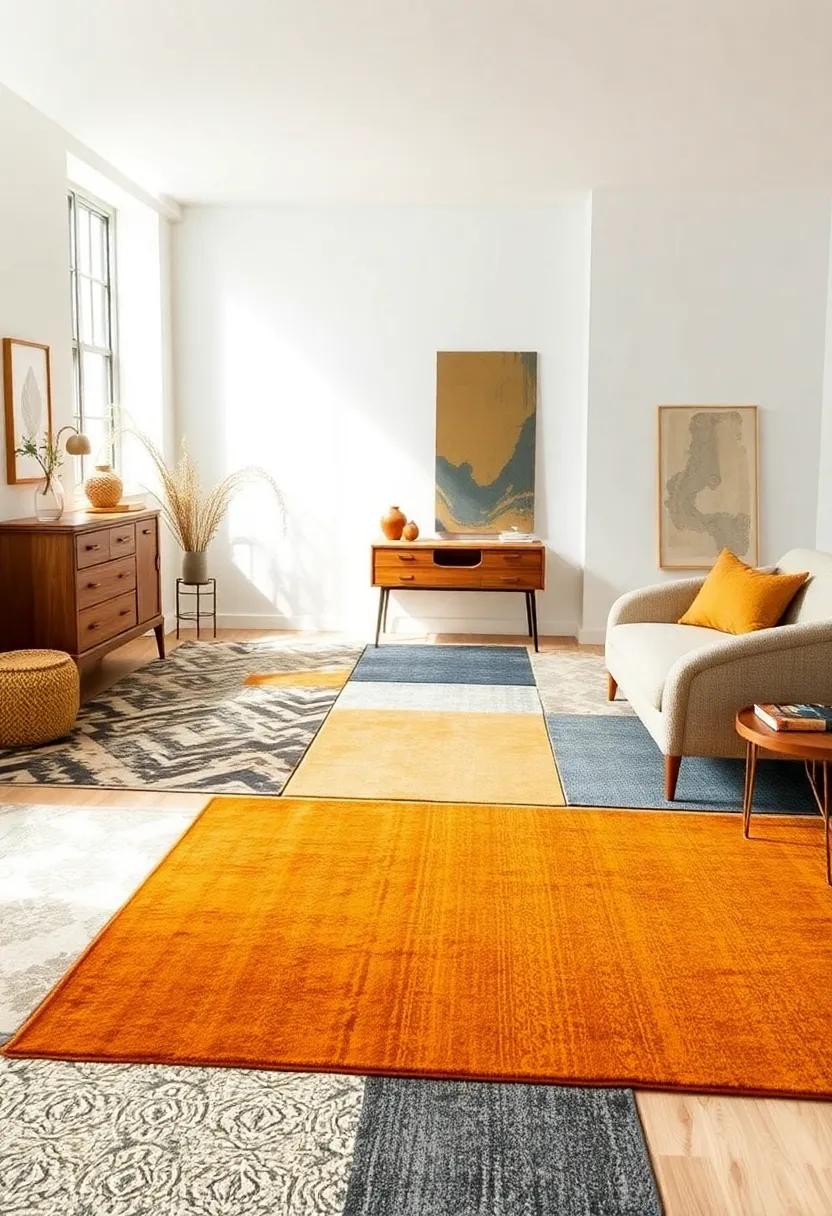
Choosing rugs that resonate with your individual style can uniquely transform your space into a personal sanctuary. Start by considering the mood you wish to evoke. Whether you desire a calming retreat or a vibrant gathering place, your selected textiles should echo that essence.Think about incorporating rugs with textures, such as a plush shag for cozy warmth or a sleek flatweave for a more modern feel. Additionally, don’t shy away from colors that speak to your personality. Bold hues can serve as statement pieces, while softer tones can create a soothing backdrop. Here are some factors to consider:
- pattern Play: Mix florals with geometric designs to create visual intrigue.
- Size Matters: Layer smaller rugs over a larger base to add dimension.
- Material Mix: Combine natural fibers like jute with synthetic for a balanced look.
To avoid a chaotic outcome in an eclectic design scheme, aim for an underlying thread that connects your choices. Select rugs that share common elements, whether through color, pattern, or style, to unify the diverse pieces in your space. A well-placed rug can anchor an area, making other mismatched decor feel more intentional.Here’s a simple overview of how different rug types can contribute to your unique aesthetic:
| Rug type | Suggested Use | Style Match |
|---|---|---|
| Vintage Persian | Layer with minimalist furniture | Bohemian, Traditional |
| Geometric Pattern | Accent colorful walls | Contemporary, Modern |
| Shag | Cozy up reading corners | Eclectic, Casual |
Transformative Spaces: How Rugs Can Change the Feel of a Room
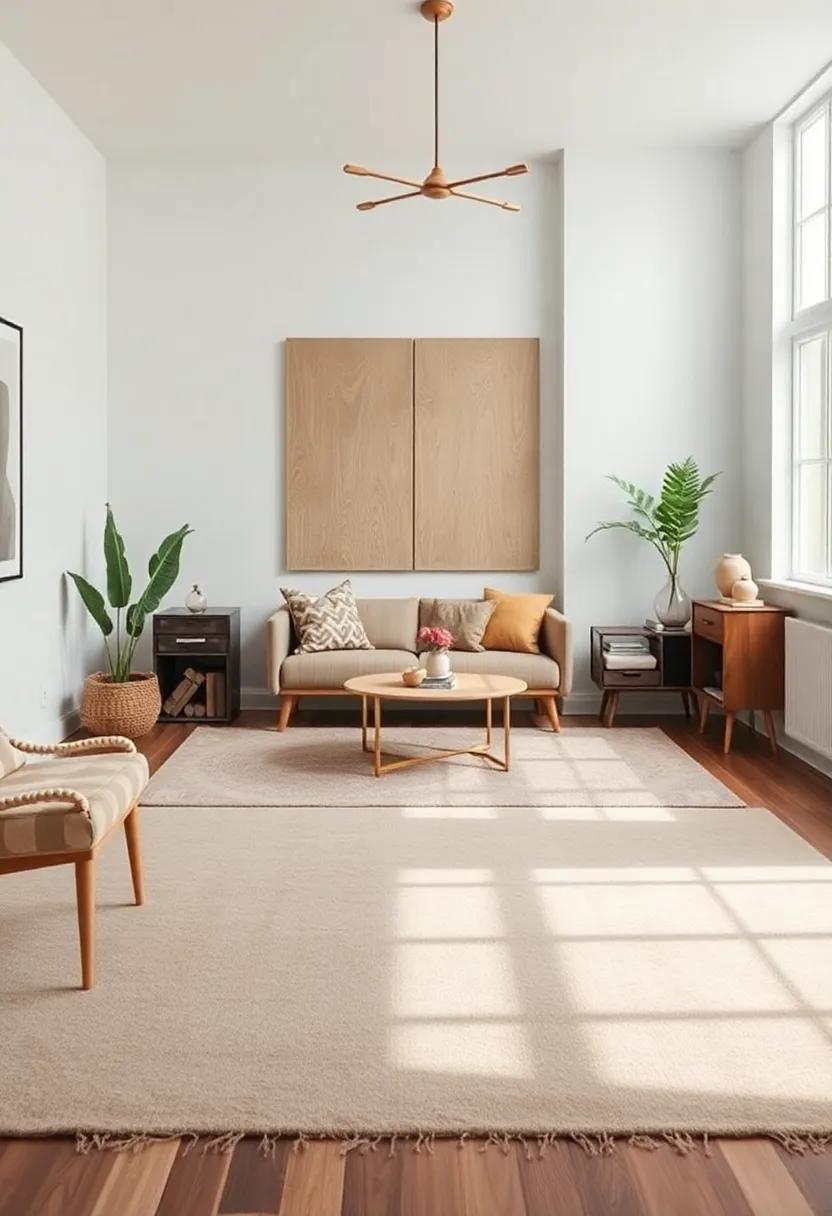
Rugs are more than mere floor coverings; they are integral elements that can redefine the atmosphere of any room. When employed thoughtfully, mismatched rugs create an eclectic tapestry of textures, colors, and patterns that can enhance or transform the space dramatically.Imagine a cozy corner adorned with a vibrant Turkish kilim beneath a vintage Scandinavian chair,contrasting beautifully with a whimsical,contemporary abstract rug underfoot. This playful interplay of styles fosters a unique ambiance that invites conversation and contemplation.
To further illustrate the transformative potential of rugs, consider the following elements that can dramatically shift the feel of your space:
- Texture: Mixing plush, shaggy rugs with sleek, flatweaves can create depth and visual interest.
- Color Palette: Use bold hues to energize a muted room or softer tones to instill tranquility.
- Pattern: Layering floral designs with geometric shapes introduces a dynamic focal point.
- Style Fusion: Combining traditional and modern rugs can establish a balanced yet vibrant environment.
| Rug Type | Key feature | Best Paired With |
|---|---|---|
| Kilim | Colorful Patterns | Mid-Century Modern Furniture |
| Shag | soft Texture | Industrial Elements |
| Jute | Natural Look | Boho Accents |
| Persian | Intricate Designs | Classical Accessories |
Blending Eras: Combining Antique and Contemporary Rugs for Timeless Appeal
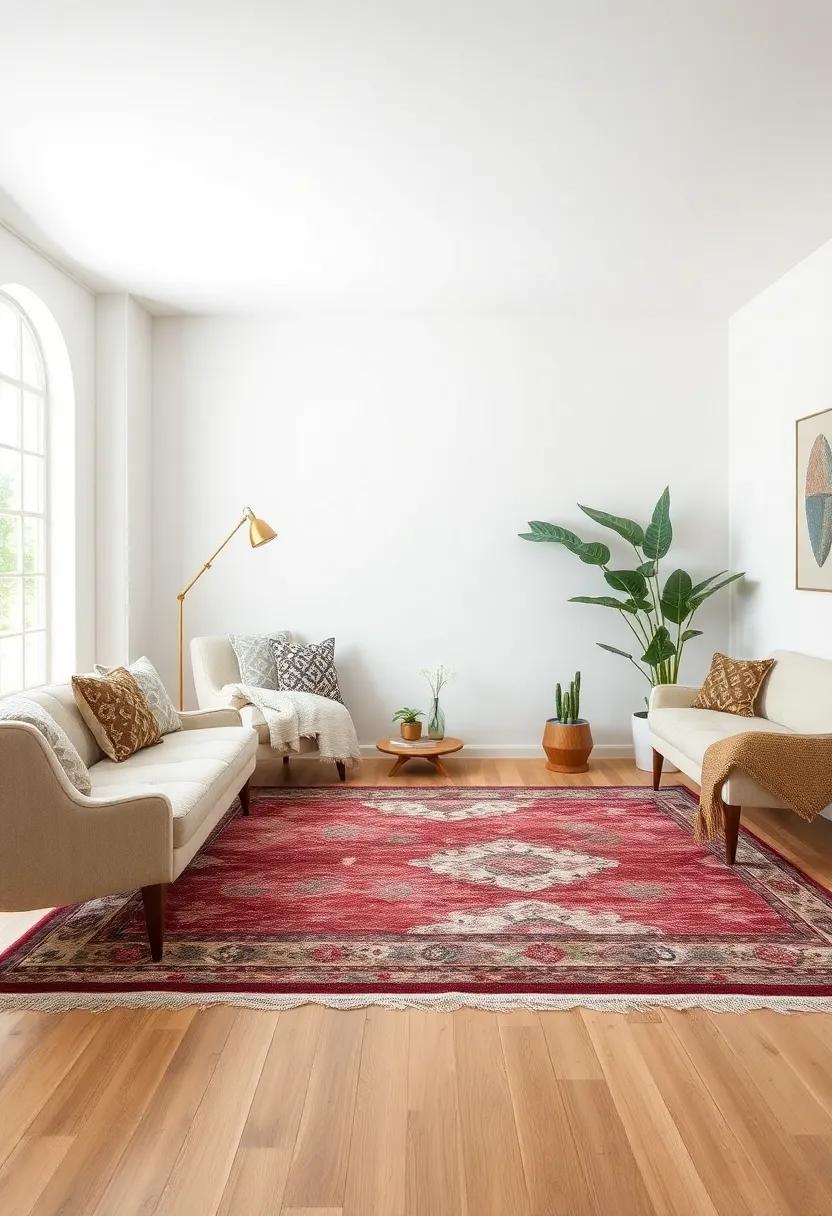
Mixing antique and contemporary rugs in your space offers an artful juxtaposition that can transform a room from ordinary to remarkable.Consider pairing a rich Persian piece with a modern geometric design to create a dialogue between different periods. The intricate patterns of an antique rug complement the clean lines of a contemporary style, creating a unique visual tension that is both engaging and inviting. Here are some tips to achieve a harmonious mix:
- Color Palette: choose rugs that share a common color scheme to create cohesion.
- scale Variations: Layer rugs of different sizes to add depth and interest.
- Texture Play: Embrace the distinct textures of each rug type to enhance tactile appeal.
Incorporating these elements not only highlights the beauty of each rug but also tells a story of your design journey. To further guide your selection, consider creating a visual table that contrasts features of antique and contemporary rugs:
| Feature | Antique Rugs | Contemporary Rugs |
|---|---|---|
| Pattern | Intricate motifs | Bold shapes |
| Material | Wool or silk | Synthetic options |
| Aesthetic | Timeless elegance | Fresh and innovative |
This combination not only breathes new life into your home but also celebrates the uniqueness of each era, inviting curiosity and admiration from all who enter.
Mood Setting: The Emotional Impact of Rugs in Eclectic Room Design
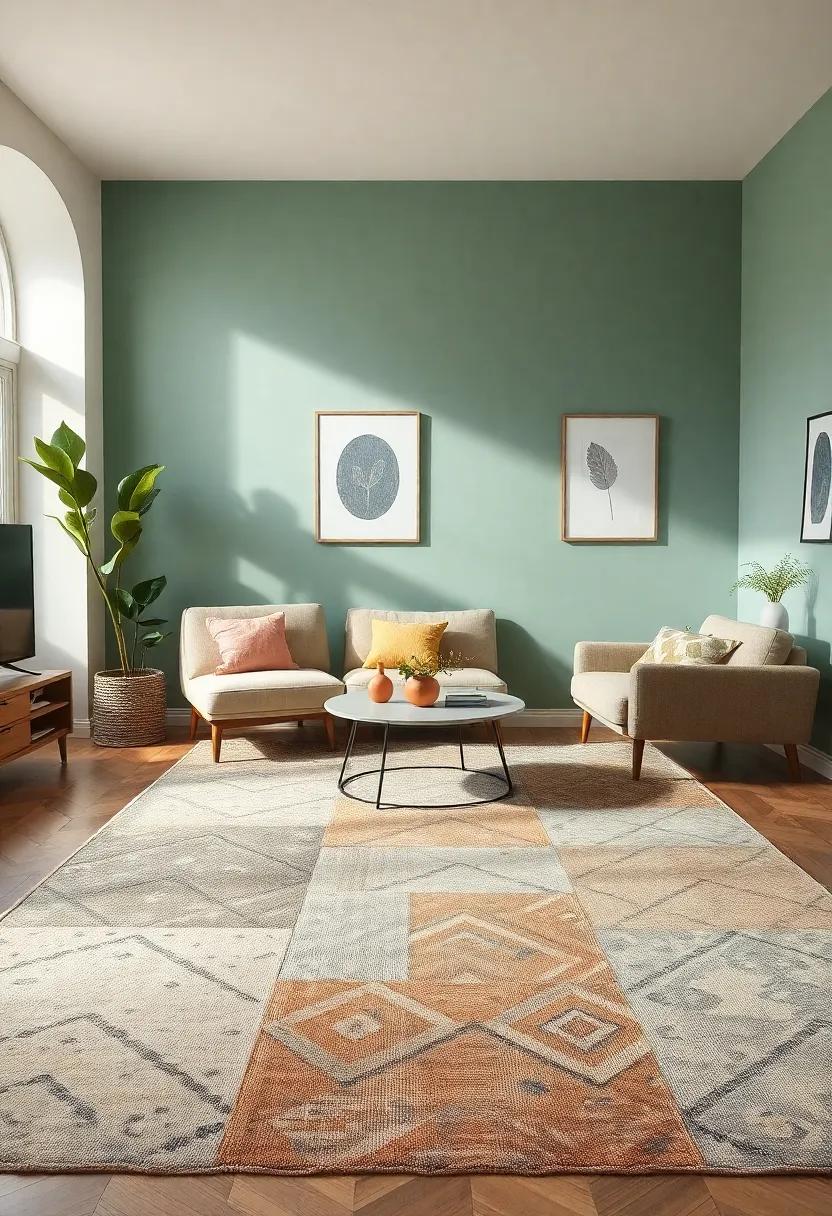
Rugs possess a unique ability to transform a space, serving as the emotional backbone in eclectic room designs. They can evoke warmth, tranquility, or even vibrancy, depending on their color, texture, and pattern. When choosing mismatched rugs, consider how each piece contributes to the overall mood of the room. Rich, deep colors can create a cozy atmosphere, while bright, bold patterns inject energy and playfulness. The tactile nature of rugs also invites a physical response; a plush, soft surface encourages relaxation, while a sleek, flat weave can inspire movement and an active engagement with the space.
To achieve a balanced emotional ambiance, it’s essential to harmonize various elements. Consider the following aspects when selecting rugs:
- Color Palette: Harmonize the hues among rugs to unify the theme.
- Texture Variety: Contrast textures for depth, mixing soft, shaggy pieces with flatweaves for dynamic interest.
- Pattern Play: Layer varied patterns that complement rather than clash, creating a vibrant visual narrative.
| Rug type | Emotional Impact |
|---|---|
| Shaggy | Cozy, Inviting |
| Flatweave | Sleek, Energizing |
| Patterned | Playful, Dynamic |
| Natural Fiber | Earthy, Grounded |
Embracing Imperfections: Celebrating Flaws in Mismatched Rugs for Character
In the world of design, perfection is often overrated, and the allure of mismatched rugs lies in their ability to tell a story through their imperfections.Each rug carries its own history, its own character, and contributes to a rich tapestry of textures and patterns that breathe life into a space. When you bring together pieces that initially seem out of place, you invite a sense of spontaneity and vibrancy into your home. Celebrate the quirks—be it a faded patch, an asymmetrical pattern, or an unexpected color clash. These little flaws can transform your decor from ordinary to extraordinary, offering visual intrigue and a personal touch.
Incorporating a variety of rugs can also foster a sense of warmth and coziness that frequently enough comes from well-loved, lived-in items. Think of the diverse possibilities when you mix:
- Vintage Persian with a modern geometric
- Chunky knits alongside soft shags
- Natural fibers with bold prints
By embracing these inconsistencies, you create an environment that reflects your personality and values—one that prioritizes authenticity over conformity. Consider crafting your unique flow by selecting colors and textures that resonate with you, irrespective of their compatibility. In this way, the so-called ‘flaws’ become the soul of your space, inviting conversation and admiration from all who enter.
The Conclusion
As we journey through the vibrant landscape of eclectic room design, it’s clear that embracing the unexpected can lead to truly remarkable spaces. Mismatched rugs, far from being a source of chaos, can become dynamic focal points that tell a story, bring warmth, and infuse character into any environment.By daring to mix patterns,textures,and colors,you not only create a visually captivating haven but also invite a sense of playfulness and individuality into your home.
So, as you step into your next decorating adventure, remember that the beauty of eclecticism lies in its unpredictability.Allow your inventiveness to weave together diverse elements, and don’t shy away from the unconventional. After all, in the world of design, it is often the unanticipated combinations that leave a lasting impression. With each rug, each choice, and each layer, you’re not merely decorating—you’re crafting a unique tapestry of experiences and memories. embrace the unexpected, and let your space reflect the lovely tapestry of your life.
 theFASHIONtamer Where Style Meets Space, Effortlessly
theFASHIONtamer Where Style Meets Space, Effortlessly 